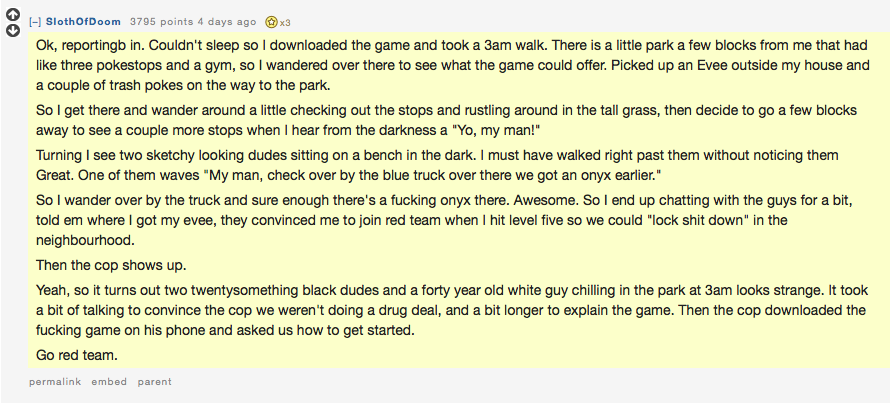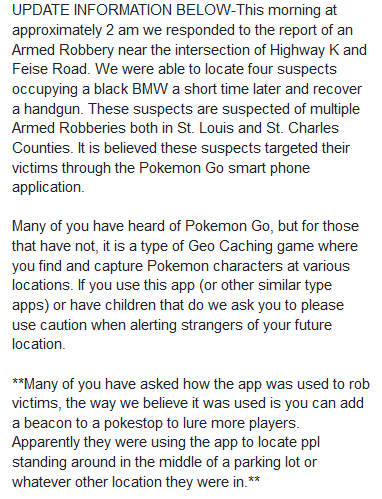
Featured Blog | This community-written post highlights the best of what the game industry has to offer. Read more like it on the Game Developer Blogs.
In the wake of PokemonGo, it's a wise idea to look at the history of MMOs and virtual worlds for lessons learned.

 I've said this before, but in the wake of the viral success of Pokémon GO, it needs to be said again. Augmented reality is just a virtual world, an MMO, a MUD even, with all of the same design issues, plus a few new ones.
I've said this before, but in the wake of the viral success of Pokémon GO, it needs to be said again. Augmented reality is just a virtual world, an MMO, a MUD even, with all of the same design issues, plus a few new ones.
The goggles fallacy
To some, particularly vets of online worlds of various stripes, this may seem obvious. But most days, it feels like the average person working in social VR, AR, and the like, is ignorant of this. It's evident in the very large pile of past lessons they are failing to heed in their designs.
But then there are also those who see these experiences as somehow qualitatively different. The commonest argument given is what I call "the goggles fallacy." Goggles or phones, as Pokémon GO is demonstrating, are just clients. A VR headset is also just a client. And as I've argued exhaustively before, clients are not the part that determines whether something is a virtual world. I'll use MMO as the base term here, as it's shorter to type and what people are currently most familiar with.
World of Warcraft has a server that simulates space. It uses a map that is based on something made up.
Pokémon GO has a server that simulates space. It uses a map that is based on the real world.
WoW has a server that tracks individual connected clients and positions them spatially on that map.
So does Pokémon GO.
WoW has little AI spawns you can interact with.
So does Pokémon GO.
In fact, if you compare the two servers, aside from the data set, they likely do the same thing across the board.
Proponents of the idea that the client matters more usually bring up questions around immersiveness, around visceral gut reactions, around ineffable sense of presence -- perhaps forgetting that as originally coined, the notion of "telepresence" was achieved with pretty crude hardware. MMOs, mirror worlds, augmented reality, lifelogging, and son are all intimately related and use the same core tech. I know the makers of Pokémon GO know this, because their CEO was involved in Meridian 59, one of the earliest MMOs, as well as in Keyhole, one of the first major mirror worlds, which became Google Earth.
 You are the client
You are the client

With smartphones, we tend to think of "the client" as meaning the little screen we stare through to catch a Pokémon. But that's not accurate. Take a look at the list of permissions that the game asks for. That's not a self-contained app. That's your whole life. You are fully an avatar. Pokémon has your email, and can send emails for you. Pokémon knows everywhere you walk. Pokémon can connect to your car. Pokémon knows who your friends are.
You are the client. You are the avatar. Your real life is what is being used for your friends list, location, chat system... all those things that you used to think of as packaged up behind an avatar, a false front. Sure, the fact is that smartphones have been gradually eating all your privacy and you've cheerfully given it up in order to get better directions and nifty alerts about traffic and so on. So this has been happening for a while. And yet.
The old adage is "never trust the client." So a big first question is "can you be trusted, since you are the client?"
The answer is probably no. For example, there are no doubt thousands of people downloading the backdoored Pokémon GO app that takes complete remote control of your phone.
But that's only the start of not trusting...
 A user-generated world
A user-generated world

The Pokémon GO database is basically a replicated version of the Ingress database, the previous game by Niantic. And said database was heavily crowdsourced. This has already led some enterprising players to wonder aloud whether they can use Ingress play to affect the locations of Pokéstops or gyms in Pokémon GO. It's also led to complaints that rural areas are Pokémon deserts, because Ingress players never built up the database entries in those locations.
However, it's also led to some artifacts that are very familiar. Here's a guy who lives in a building that Ingress players (presumably) labeled as a Pokémon GO gym. What are the implications here? Aside from the very real risk of constant home invasions, we're seeing a game AR layer used to directly affect home value and livability, outside of the owner's control. Some are seeing this as a benefit, as in the examples of real estate listings using Pokémon GO data as a value-add. Others, who have reported a dozen people in their backyard at 2am, are less happy.
What is the fruition of this? Long ago, in Star Wars Galaxies, we allowed players to freely build homes and even cities, anywhere on the map that wasn't explicitly disallowed. Cities allowed players to set rules about who could attack other players within their borders. A few sneaky players set up their cities surrounding or even directly on top of designer-created content, and then started extorting players who wanted to visit that content -- or just killing them, in the game. (You can't kill another player in Pokémon GO, but... you are the client. We'll get back to that in a second).
 Affecting the real world economy
Affecting the real world economy

So here we are affecting the livability of real estate. But Pokémon GO might also need to take heed of the lessons from managing game economies in MMOs as well. We learned through some very painful lessons exactly how powerful our control of the economy was pretty early on in MMOs, after some big mistakes. Like, that one time we accidentally created an entire secondary market and exchange rate between real world money and digital assets, oops. Surely that can't happen with Pokémon , can it?
Well, actually... we're already seeing coffee shops advertising discounts for those who happen to be on specific Pokémon GO teams, and today there was a Forbes article giving business advice about how to leverage the game layer for more customers. Make no mistake, these are the first steps towards real-money trade, and are another way in which the game is affecting the economy. There has already been discussion of how there will be Pokémon trading; expect this to spill over into real world effects immediately. After all, Randy Farmer laid it out very clearly back in 2004:
So, the steps on the virtual economy slippery slope are:
Gifting → Twinking
Gifting + Multiple Chars/Server → Muling
Gifting + Messaging + Trust → Trading
Trading – Messaging – Trust + In World Machinery → Robust Trading
Robust Trading + Scarcity + Liquidity → External Market (eBay)
External Market – Trust + In World Machinery → GOM
Beyond that, there's a very real question of fairness. If one coffee shop or bar is a Pokéstop and another one isn't, Niantic or Nintendo are literally putting their thumb on the scale of which business does better on a given street. If the game continues to thrive, expect this to become a sore spot for people who suddenly found their real life business slurped into a game map.
Player versus player
Player vs player activity is a common element of the elder game in MMOs. Pokémon GO has gone ahead with this, and following on the model from Ingress and earlier AR games, has allowed for PvP activity in capturing gyms to one team or another.
But... you're the client. It's trivial to envisage a gym made physically inaccessible by other players -- locked doors? Physical intimidation?
Already, given the recent shootings of black men and the sniper attack at the Black Lives Matter protest in Dallas, some have raised concerns about "Pokémon While Black" as a possible risk to life and limb. There are also, thank heavens, stories about the exact opposite as in the widely circulated image telling the story of a mixed race group in a park in the middle of the night, possibly suspected of making a drug deal, but instead persuading the police officer who showed up to instead join them in playing the game.

But is the fear overblown? Well, no. You're the client, and there's no PK switch in real life. In Ultima Online circa 1998, when we were available in Hong Kong, we suffered through the problem of actual real life triad gangs forming guilds and engaging in PK wars. Then they took those fights to the real life streets. Far as I know, Pokémon GO doesn't have a "call the admins, uh, I mean police" panic button. Make no mistake: by creating teams at all, this game has put in place at least a little context encouraging players to aggress one another. The developers only hope that it only happens via game-sanctioned means.
The stuff that has not happened.... yet
Don't get me wrong. The social element here is powerful. Pokémon GO has the best emote system available: the human body. It has the most elegant and all consuming chat system ever: smartphones for tells and local voice with full presence for local chat. It has the most detailed and highly simulated game map ever, thanks to the real world. We are seeing amazing social activity happening, amazing bursts of joy, across the world.
But we should absolutely expect everything that happened in MMOs to happen here, because AR is an MMO. Every bug, every emergent feature you thought was cool in WoW or EVE Online, to happen here, but in your local park and (goodness!) at your local church.
I'm happy to see that Niantic has decided, a few days after launch, that maybe it might be important to hire a community manager.
But really, it's a little late to this idea that maybe they are running a community. It should have been obvious. After all, they have avatars. Who talk. Who will trade. Who move about a world. Who acquire stuff. Who interact. They affect the map. They affect the real world economy. Soon you'll see each other's profiles, sue the game to track them across the world, and probably much more, if not in this game, then in others.
This is a government
 We have a name for entities in the real world which have access to your private data, which have controls on the economy, which can unlaterally affect real estate values, and which can set forth rules via commission or omission on how people interact. In the virtual worlds, we said that those who had power over the world were gods, immortals, wizards.
We have a name for entities in the real world which have access to your private data, which have controls on the economy, which can unlaterally affect real estate values, and which can set forth rules via commission or omission on how people interact. In the virtual worlds, we said that those who had power over the world were gods, immortals, wizards.
Facebook, Google, and yes now Nintendo, The Pokémon Company, and Niantic, as they move into AR, are basically like governments. And if they are going to start impinging upon the public sphere, it's getting to be time that they take it seriously and actually walk through the consequences and ripple effects of what they are doing.
In O'Fallon, Missouri, we see the game tool of "Pokémon lures" used to entrap armed robbery victims. This is a direct consequence of the game mechanics, a behavior that this game enables that was not possible before.
Already we see people photoshopping Pokémon onto armed police in SWAT gear in Baton Rouge. What happens when the tools you enable for this innocent game are used in radically different social contexts?
So here we go again, because every year this little bit of writing gets to be more and more pointed:
Someday there won’t be any admins. Someday it’s gonna be your bank records and your grocery shopping and your credit report and yes, your virtual homepage with data that exists nowhere else. Someday it’s gonna be Snow Crash and Neuromancer and Otherland all wrapped up into one, and it may be a little harder to write to Customer Service. Your avatar profile might be your credit record and your resume and your academic transcript, as well as your XP earned.
On the day that happens, I bet we’ll all wish we had a few more rights in the face of a very large, distributed server, anarchic, virtual world where it might be very very hard to move to a different service provider.
Not long ago, I spoke with a very high-powered Silicon Valley exec. I asked this person about the ethical implications of social VR and AR. Their response was "what ethical implications?"
Frankly, that scared the shit out of me. You design this society. Intentionally or unintentionally, you are shaping how people will behave.
Further Reading
There's a bunch of science fiction you should read.
The fullest exploration of AR gaming is Vernor Vinge's Rainbows End [Amazon].
To think about crossover of virtual and real world behavior, I suggest Cory Doctorow's For the Win [Amazon].
I'd also suggest Charles Stross' Halting State [Amazon] as a good exploration of this crossover.
If you are doing anything at all with social VR or AR, please please please read up on the history of virtual worlds. Realize that in your cluelessness you may well recreate some famously ugly moments, only this time with even greater psychological and physical consequence. If you do, it's entirely on you.
Julian Dibbell's "A Rape in Cyberspace," or even better the entirely of the book My Tiny Life [Amazon]. The capabilities of the virtual world described here aren't yet available in AR or VR, but they're coming pretty quick.
The Black Rose Incident is illustrative of gamer psychology in virtual settings, and how quickly and easily we can dehumanize.
The aforementioned Rights of Avatars is, if I may humbly say so, foundational to your understanding of what is going to eat your life.
Dr Richard Bartle's Designing Virtual Worlds [Amazon] should open eyes as to the full array of issues you need to worry about when creating a virtual world -- of any stripe.
Alternatively, consider hiring any of the many folks experienced in this arena, and actually listening to them.
Read more about:
Featured BlogsAbout the Author(s)
You May Also Like








